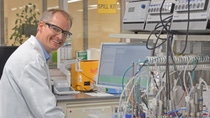Media
Breast milk, beer & bacteria – a scientist's passion for fermentation chemistry

Jens Plassmeier is the Senior Team Leader for Biobased Chemicals at BASF’s R&D site in Tarrytown, NY. A transplant from Germany, Jens has been living in the U.S. for almost 10 years, while gaining a reputation as a research expert in metabolic engineering and synthetic biology. Together with his Biobased Chemicals team, he is working on the development of Human Milk Oligosaccharides (HMOs) to improve infant nutrition. By reproducing the special prebiotics found naturally in a mother's breast milk, infant milk formula that includes HMOs provides positive effects previously only available through breastfeeding. He recently took time out of his busy schedule for a quick Q&A with BASF North America Marketing Communications.
What is so special about your research project?
I’m proud to contribute research that is meaningful – ensuring the best nutrition for infants. While breast milk is the ultimate nutrition option for babies, a lot of mothers can’t breastfeed for various reasons. Personally, my wife and I went through the stressful time of barely being able to meet our daughter’s feeding needs, and early on we had to add infant formula. We looked for the best formula options but at that time advanced formulas with HMOs were not available. At BASF, we now try to provide solutions to help improve infant nutrition by making formula similar to a mother’s breast milk. As a father, I know how important it is to provide the best start for our kids. With every HMO we reproduce, we make infant nutrition a bit better. HMOs are important because they help strengthening the developing immune system by supporting beneficial bacteria to grow. There is indication that they are also important for brain development—a topic of great interest to me as a scientist.
What makes this research unique?
It’s very challenging to make HMO molecules, but they have amazing benefits to society. That’s why I’m excited to work on such a great project. Plus, I’m truly fascinated by fermentation. The technology has been used for thousands of years and it is a very efficient and sustainable way of making molecules we need in our daily lives. For example, one of the most important applications for fermentation is brewing beer. With my German heritage, how could I not have positive feelings for this technology?
One of the most important applications for fermentation is brewing beer. With my German heritage, how could I not have positive feelings for this technology?
Bodybuilders have indicated that they also see the benefits of using infant nutrition such as HMOs to improve their bodies. What do you think about this application of your products?
The idea of grown-up, muscle-loaded adults drinking infant formula is of course a little bit surprising. But to be honest, it’s fine with me and I’m happy to support any kind of health benefits our products can bring. It was not the primary purpose for our HMO research, but if there are benefits beyond the infant nutrition market, then why not? There may even be other HMO applications and benefits for adult nutrition that we don’t fully understand at this time. For this reason, BASF is currently exploring the potential of HMOs in adult nutrition—for example the ways it may help improve digestive health, provide immune support as well as beneficial gut microbiota. I’m a sports person myself—not bodybuilding but obstacle running. If my research can help bodybuilders and other performance athletes achieve their goals, that is great. I’m happy to work on health benefits for people of all ages.
What kind of projects would you like to work on in future?
While I love the work I’m doing on HMOs, there are other scientific areas that inspire my imagination. For example, plastic waste in the environment is one of today’s most urgent global problems to solve. I would also like to conduct research on biobased and biodegradable polymers, or develop new ways of producing sustainable feedstocks, to convert food waste into sustainable products, as an example. Projects like this could have a huge impact on both society and environment – and at the end of the day, this is what really drives me.
What is your wish for the future of your profession?
There is so much potential in biological engineering. Consider insulin: I don’t think anybody would argue that producing insulin using engineered microorganisms would be a bad thing— especially compared to former insulin products that are based on pigs’ blood. I’m happy that at BASF, I have found a work environment that empowers my research efforts. With all the opportunities for collaboration, all those partners in industry and science and funds allocated to exploring new research areas, I have the chance to work with some of the brightest minds in science and academia. I’m convinced that through the power of collaborative research, we can tackle even further challenges that are and will become important for society and our planet.
For media inquiries or questions, please contact: katharina.meischen@basf.com